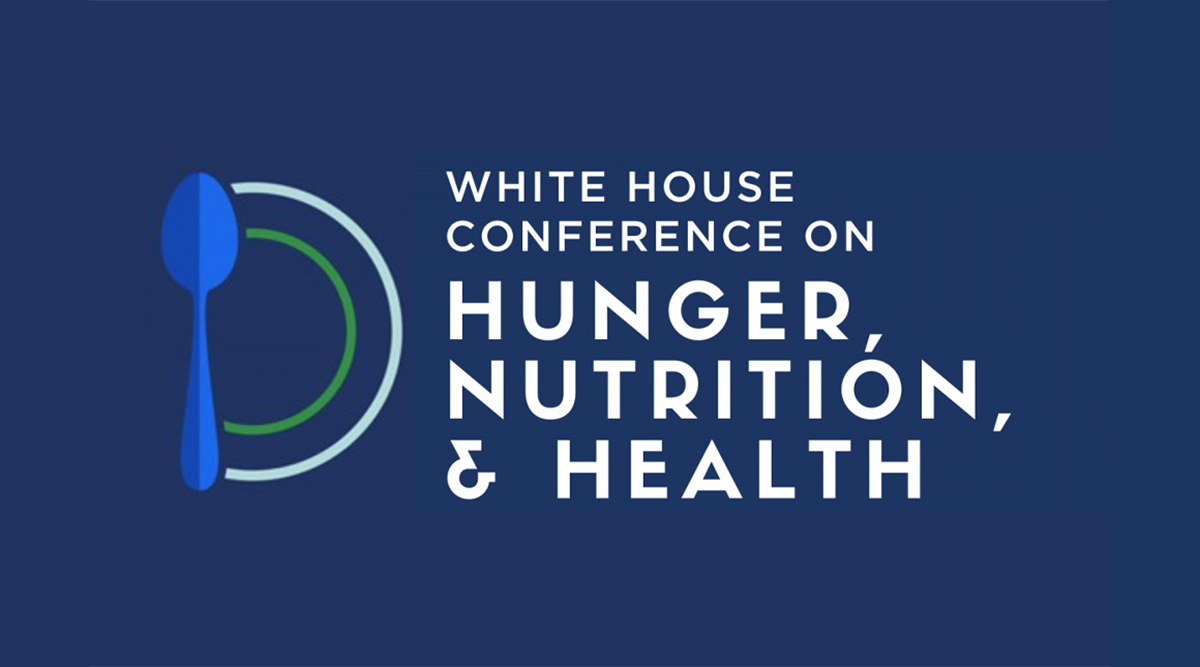The White House Conference Was Only the First Step
DIALOGUE


“Conference spurred historic change, improved Americans’ health by reducing dietary diseases and ending hunger”
That’s the headline I hope to see in 2023 as a result of September’s White House Conference on Hunger, Nutrition, and Health. It was a big event with big goals, only the second such conference with this focus and the first in 50 years.
The historic day brought together leaders across the food system, individuals with lived experiences, policy makers, researchers, and more, all with a common goal—to end hunger and reduce diet-related diseases in the United States by 2030.
It was also a much-needed and long-overdue convening, as 42% of American adults are obese and one in three have prediabetes.
The conference was designed around five strategic pillars of the National Strategy for Hunger, Nutrition, and Health, which address food access/affordability; integrating nutrition and health; empowering consumers to make healthy choices; promoting physical activity; and enhancing nutrition and food security research. The pillars served as reference points for discussions, breakouts, and presentations.
While attending the general sessions, networking, and engaging in breakouts, one thing became painfully clear: Too many of us are working in silos.
There are many organizations, government agencies, companies, and committed citizens doing many great things to help improve health and food and nutrition security in the United States. Learning about these efforts was exciting and inspirational. But their work is often segmented and disconnected. We have a lot to learn from each other, and better data sharing, best practices, and collaborating are critical to help us all scale solutions.
The National Strategy’s whole-of-government approach is a first step at breaking silos and was seen on the day of the conference, from U.S. Department of Agriculture (USDA), Food and Drug Administration (FDA), and White House staff and others leading discussion sessions to current and former members of Congress presenting and hosting. It was also evident in the FDA’s proposed rule defining “healthy” as a nutrient content claim—a rule years in the making that pulls from across agencies as it references the USDA Dietary Guidelines for Americans, in a foods-first proposed definition.
But a whole-of-government approach will also require whole-of-society partnerships. Building partnerships across government, nongovernmental organizations, and the private sector will be essential. Science of food professionals are in a unique position to spark solutions across the food system. Food brings people together, but food science brings the food system together.
Upstream to the farm, downstream to nutrition and consumers, food science unites and brings food and nutrition to scale while simultaneously ensuring safety. As we look to the future, we need to research, collaborate, and innovate across the food system, elevating the critical, connecting role of food science solutions to improve food and nutrition security and health.
If we’re going to reach the 2030 goal, we’ll all need to help break down the silos and work together, across agencies, across departments, and across the broader food system.
At IFT, we’re highlighting the role of food science for food and nutrition security with our Food & Nutrition Security Steering Committee. This group of eight global food science professionals works to identify challenges in food and nutrition security with food science solutions. Over the coming year, we’ll be hosting expert roundtables on several of the challenges with plans to publish reports shortly following the convenings. This effort is one of several commitments we’ve made to the White House Conference on Hunger, Nutrition, and Health. It’s also what makes me excited to be a part of IFT, where connecting global food system communities to advance the science of food is at the core.
What will you do to help connect the food system and bring forward food science solutions to help end hunger and reduce diet-related diseases by 2030? Join us. Engage. Advocate. We’re better together.
The opinions expressed in Dialogue are those of the author.
Digital Exclusives

10 Food Trend Predictions for 2022
The editors at Food Technology magazine, published by the Institute of Food Technologists (IFT), have announced their predictions for the hottest food trends for 2022.
Food Technology Articles

Cultivating a Crop of Food System Solutions
Five organizations dedicated to eliminating hunger and sustainably boosting nutrition earn top honors in this year’s Seeding The Future Global Food System Challenge.

Unlocking the Food System of the Future
Sean Leighton and Luuvan Hoang reflected on the benefits of generational collaboration and inspiration.

Soda With (Possible) Benefits
A look at the prebiotic soda category.

Tapping Into the Power and Potential of Bioactives
As bioactive ingredients move closer to mainstream applications, proponents work to advance awareness of their benefits.

Feeding the World Through Science
Christopher R. Daubert reflects on the importance of raising awareness of the science of food discipline.
Recent Brain Food

April Content Spotlight: AgTech
Stay up to date on the latest topics and trends in agricultural technology with IFT's featured resources, from blogs to peer-reviewed articles to on-demand videos.
February Content Spotlight: Health and Nutrition
Stay up to date on the latest health and nutrition topics and trends with IFT's featured resources, from blogs to peer-reviewed articles to on-demand videos.
Tapping the Healing Power of Food
IFT's Anna Rosales reports back on the inaugural Food is Medicine Summit, a key milestone in the national strategy to end hunger and reduce chronic disease by 2030.
January Content Spotlight: Consumer Insights
Stay up to date on the latest consumer insights topics and trends with IFT's featured resources, from blogs to peer-reviewed articles to podcasts.
Championing Food Safety Standards Worldwide
As the U.N.'s Codex Alimentarius Commission marks 60 years, IFT's Codex coordinator describes its impact on the global food system and why IFT members should get involved.
